Burt A. The Evolution of the British Empire and Commonwealth From the American Revolution
Подождите немного. Документ загружается.

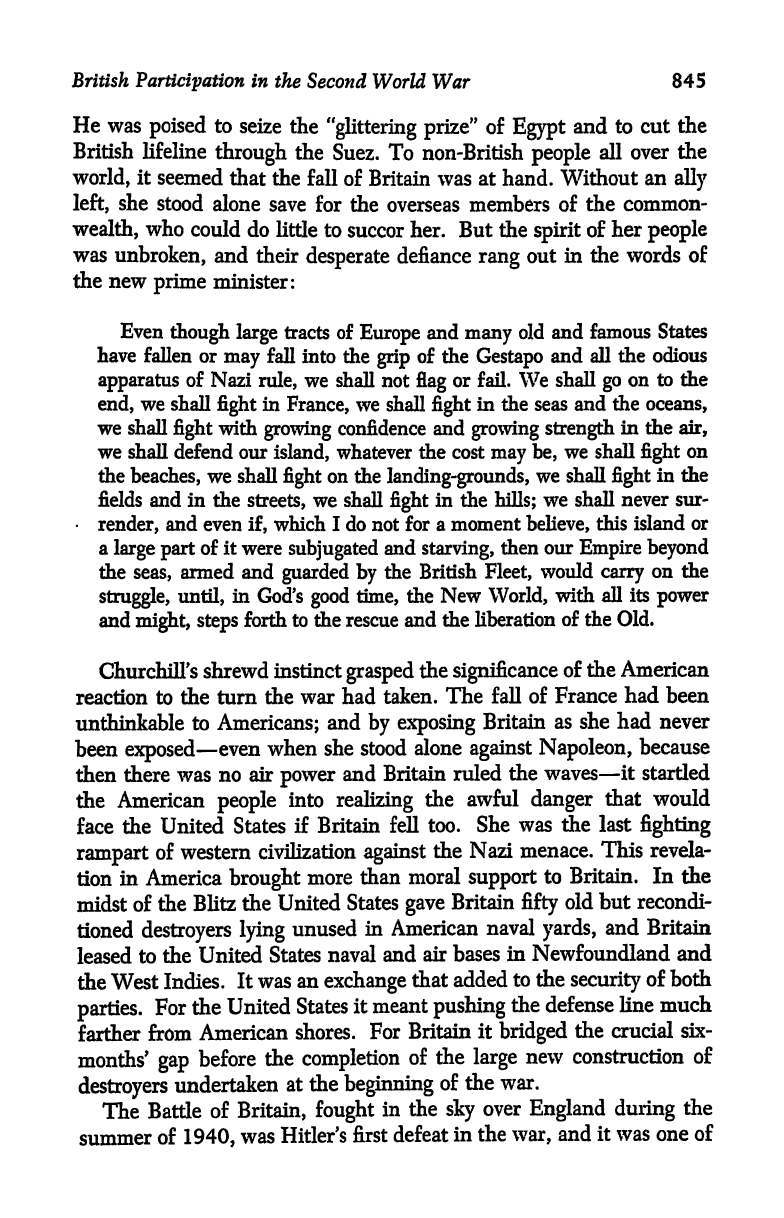
British
Participation
in
the
Second
World War
845
He
was
poised
to
seize
the
"glittering
prize"
of
Egypt
and to
cut
the
British
lifeline
through
the
Suez.
To
non-British
people
all
over
the
world,
it
seemed
that
the
fall of Britain
was at hand. Without
an
ally
left,
she
stood
alone
save
for the
overseas
members
of
the common-
wealth,
who
could
do
little to
succor
her. But the
spirit
of
her
people
was
unbroken,
and
their
desperate
defiance
rang
out
in the words
of
the new
prime
minister:
Even
though large
tracts of
Europe
and
many
old
and
famous States
have
fallen or
may
fall into
the
grip
of
the
Gestapo
and
all
the odious
apparatus
of Nazi
rule,
we shall not
flag
or fail. We
shall
go
on
to the
end,
we shall
fight
in
France,
we shall
fight
in
the seas
and
the
oceans,
we shall
fight
with
growing
confidence and
growing
strength
in the
air,
we
shall defend our
island,
whatever
the cost
may
be,
we shall
fight
on
the
beaches,
we shall
fight
on
the
landing-grounds,
we
shall
fight
in the
fields and in
the
streets,
we shall
fight
in
the
hills;
we shall never
sur-
render,
and
even
if,
which I do not for a
moment
believe,
this
island
or
a
large part
of
it
were
subjugated
and
starving,
then
our
Empire beyond
the
seas,
armed and
guarded by
the British
Fleet,
would
carry
on the
struggle,
until,
in God's
good
time,
the
New
World,
with
all its
power
and
might,
steps
forth to the rescue and the liberation
of the
Old.
Churchill's
shrewd instinct
grasped
the
significance
of
the American
reaction to
the turn
the war had
taken.
The
fall of France
had
been
unthinkable
to
Americans;
and
by
exposing
Britain
as she had never
been
exposed
even
when she
stood
alone
against
Napoleon,
because
then there
was no
air
power
and Britain
ruled
the
waves it
startled
the
American
people
into
realizing
the
awful
danger
that would
face the
United States
if
Britain
fell too.
She
was the last
fighting
rampart
of
western civilization
against
the Nazi
menace.
This revela-
tion
in
America
brought
more
than
moral
support
to
Britain.
In
the
midst
of
the Blitz
the
United States
gave
Britain
fifty
old but
recondi-
tioned
destroyers
lying
unused
in American
naval
yards,
and
Britain
leased
to the
United
States
naval
and
air bases
in Newfoundland and
the
West
Indies.
It
was
an
exchange
that added
to
the
security
of both
parties.
For
the
United
States
it meant
pushing
the
defense
line much
farther
from
American
shores.
For
Britain it
bridged
the
crucial
six-
months'
gap
before
the
completion
of
the
large
new construction of
destroyers
undertaken
at the
beginning
of
the
war.
The
Battle
of
Britain,
fought
in
the
sky
over
England during
the
summer
of
1940,
was
Hitler's
first
defeat
in the
war,
and
it was
one
of
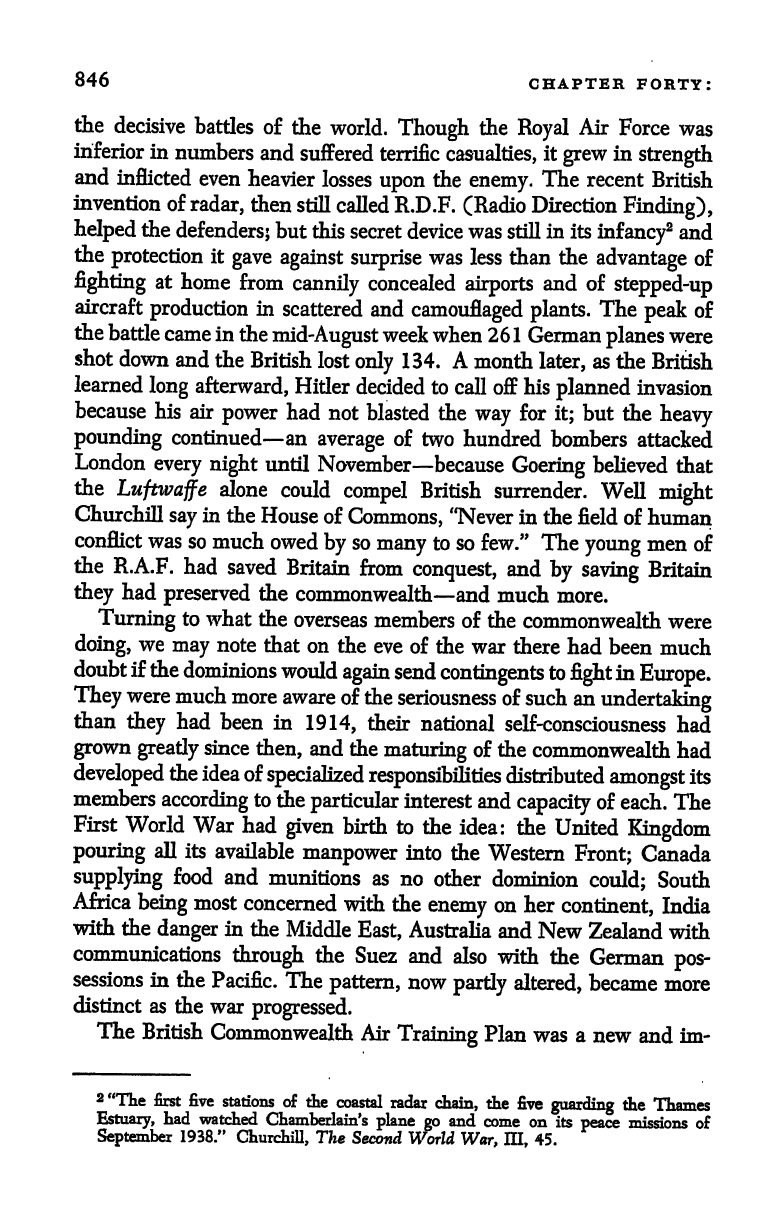
846
CHAPTER
FORTY:
the
decisive
battles of
the
world.
Though
the
Royal
Air
Force
was
inferior
in
numbers
and
suffered terrific
casualties,
it
grew
in
strength
and
inflicted
even
heavier
losses
upon
the
enemy.
The recent
British
invention
of
radar,
then
still
called
R.D.F.
(Radio
Direction
Finding),
helped
the
defenders;
but this secret
device was still
in its
infancy
2
and
the
protection
it
gave
against surprise
was
less
than the
advantage
of
fighting
at
home
from
cannily
concealed
airports
and of
stepped-up
aircraft
production
in
scattered and
camouflaged
plants.
The
peak
of
the
battle
came
in
the
mid-August
week
when 261 German
planes
were
shot
down
and the
British
lost
only
134. A month
later,
as the
British
learned
long
afterward,
Hitler
decided to call off his
planned
invasion
because
his air
power
had
not
blasted the
way
for
it;
but the
heavy
pounding
continued an
average
of
two
hundred
bombers
attacked
London
every
night
until
November
because
Goering
believed
that
the
Luftwaffe
alone
could
compel
British surrender.
Well
might
Churchill
say
in
the
House
of
Commons,
"Never in
the field
of
human
conflict
was
so
much
owed
by
so
many
to so few." The
young
men
of
the
R.A.F.
had saved
Britain
from
conquest,
and
by
saving
Britain
they
had
preserved
the
commonwealth
and much more.
Turning
to
what
the
overseas
members
of the
commonwealth
were
doing,
we
may
note
that
on
the
eve
of the war
there had
been
much
doubt
if the
dominions
would
again
send
contingents
to
fight
in
Europe.
They
were
much
more
aware
of the
seriousness
of such an
undertaking
than
they
had
been
in
1914,
their
national
self-consciousness
had
grown
greatly
since
then,
and
the
maturing
of the
commonwealth
had
developed
the
idea
of
specialized
responsibilities
distributed
amongst
its
members
according
to
the
particular
interest
and
capacity
of
each.
The
First
World
War
had
given
birth
to the
idea: the
United
Kingdom
pouring
all its
available
manpower
into the
Western
Front;
Canada
supplying
food
and
munitions
as
no
other
dominion
could;
South
Africa
being
most
concerned
with
the
enemy
on her
continent,
India
with
the
danger
in the
Middle
East,
Australia
and
New
Zealand with
communications
through
the
Suez
and
also
with
the
German
pos-
sessions
in the
Pacific.
The
pattern,
now
partly
altered,
became
more
distinct
as
the war
progressed.
The
British
Commonwealth
Air
Training
Plan
was a
new
and
im-
2
"The
first five
stations
of
the coastal
radar
chain,
the
five
guarding
the
Thames
Estuary,
had
watched
Chamberlain's
plane
go
and
come
on
its
peace
missions
of
September
1938."
Churchill,
The
Second
World
War,
ILL,
45.
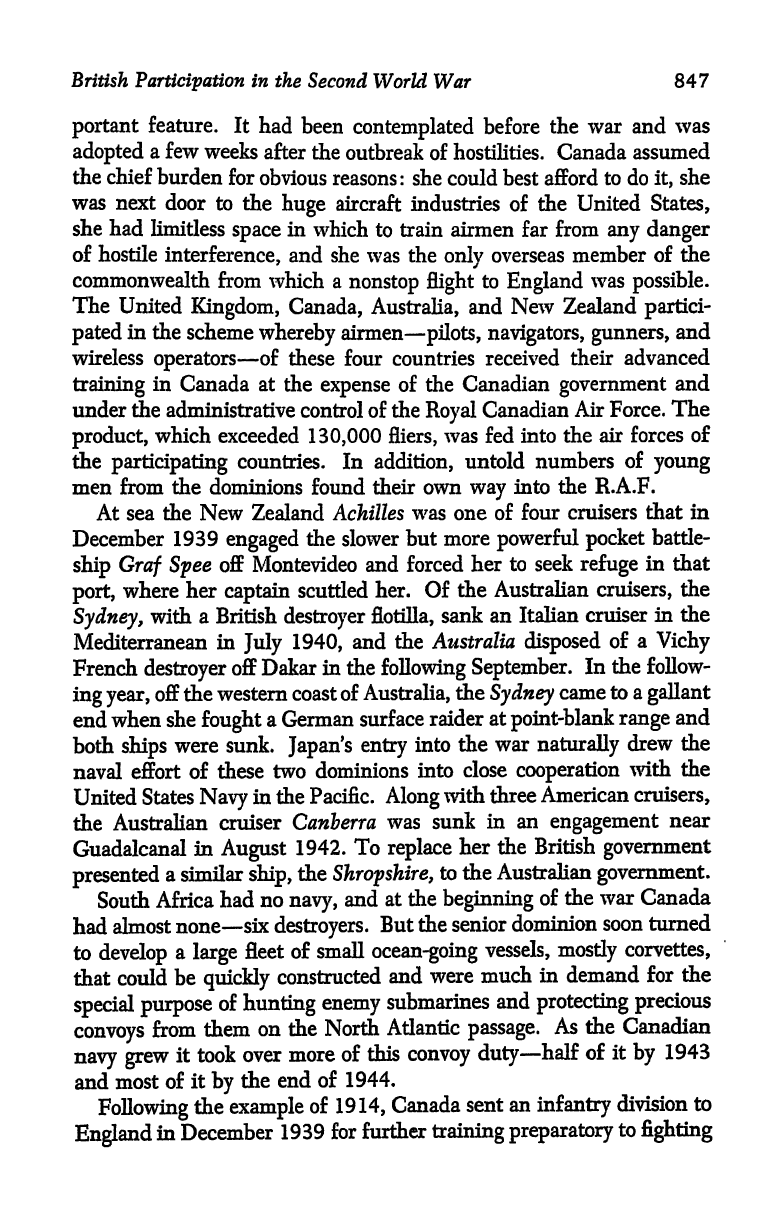
British
Participation
in
the Second
World
War
847
portant
feature.
It
had
been
contemplated
before
the
war and
was
adopted
a
few
weeks
after
the outbreak
of
hostilities. Canada
assumed
the
chief
burden
for
obvious reasons
:
she could
best
afford
to
do
it,
she
was next
door
to
the
huge
aircraft
industries of
the
United
States,
she had
limitless
space
in
which
to
train airmen far from
any danger
of
hostile
interference,
and she was the
only
overseas
member
of
the
commonwealth
from
which
a
nonstop
flight
to
England
was
possible.
The
United
Kingdom,
Canada,
Australia,
and New Zealand
partici-
pated
in the
scheme
whereby
airmen
pilots,
navigators,
gunners,
and
wireless
operators
of
these four countries
received
their advanced
training
in
Canada
at
the
expense
of the
Canadian
government
and
under the
administrative
control of
the
Royal
Canadian
Air Force.
The
product,
which exceeded
130,000 fliers,
was fed
into the
air
forces
of
the
participating
countries. In
addition,
untold
numbers
of
young
men from
the
dominions found their
own
way
into
the
R.A.F.
At sea the New
Zealand Achilles
was one of
four
cruisers that
in
December
1939
engaged
the
slower
but
more
powerful
pocket
battle-
ship
Graf
Spee
off Montevideo
and forced
her
to
seek
refuge
in that
port,
where
her
captain
scuttled
her.
Of
the
Australian
cruisers,
the
Sydney,
with
a
British
destroyer
flotilla,
sank
an Italian
cruiser
in the
Mediterranean
in
July
1940,
and the
Australia
disposed
of
a
Vichy
French
destroyer
off
Dakar
in the
following September.
In
the
follow-
ing
year,
off the
western
coast of
Australia,
the
Sydney
came to
a
gallant
end
when she
fought
a German
surface
raider
at
point-blank
range
and
both
ships
were
sunk.
Japan's
entry
into
the
war
naturally
drew
the
naval effort of
these
two
dominions
into
close
cooperation
with the
United
States
Navy
in the
Pacific.
Along
with
three
American
cruisers,
the
Australian
cruiser
Canberra
was sunk
in an
engagement
near
Guadalcanal
in
August
1942. To
replace
her the
British
government
presented
a similar
ship,
the
Shropshire,
to
the
Australian
government.
South
Africa
had
no
navy,
and
at the
beginning
of
the
war Canada
had
almost
none
six
destroyers.
But the
senior
dominion
soon turned
to
develop
a
large
fleet
of
small
ocean-going
vessels,
mostly
corvettes,
that
could
be
quickly
constructed
and
were
much
in
demand
for
the
special
purpose
of
hunting
enemy
submarines
and
protecting
precious
convoys
from
them
on the
North
Atlantic
passage.
As
the Canadian
navy grew
it took over
more of
this
convoy
duty
half of
it
by
1943
and
most
of
it
by
the
end
of
1944.
Following
the
example
of
1914,
Canada
sent
an
infantry
division
to
England
in December
1939
for
further
training
preparatory
to
fighting
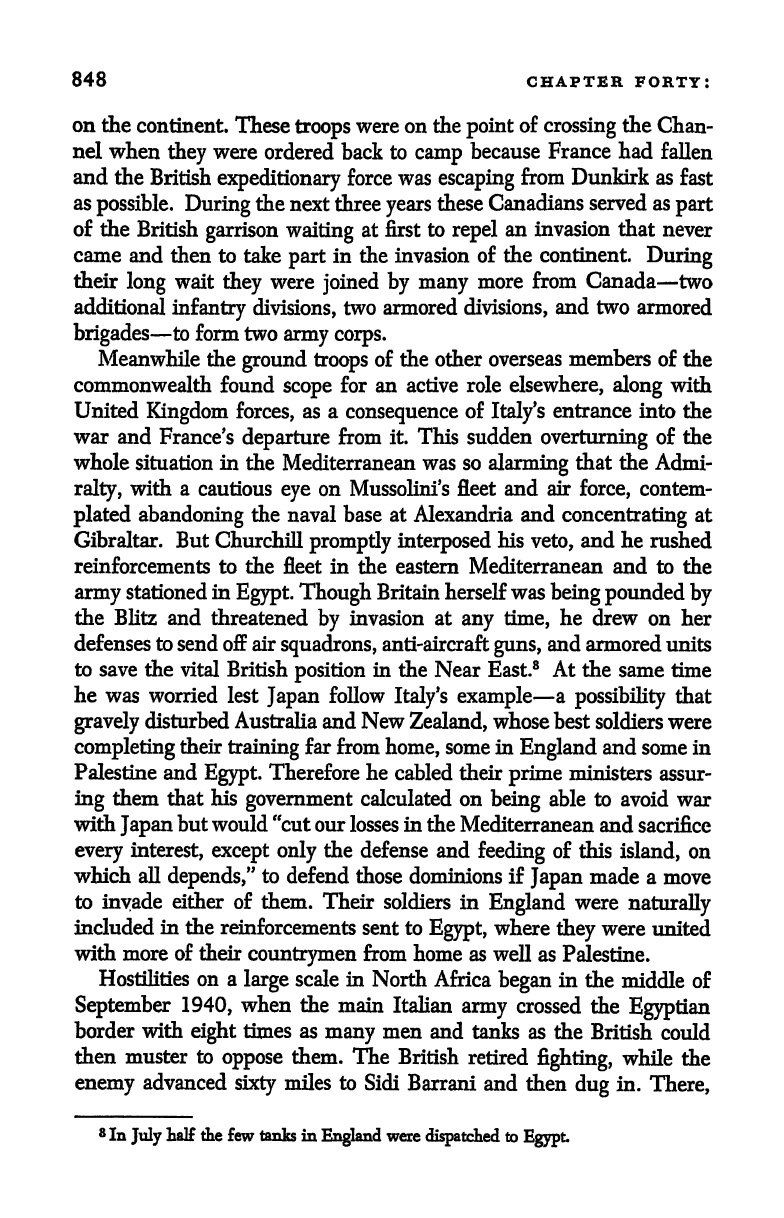
848
CHAPTER
FORTY:
on
the continent.
These
troops
were on
the
point
of
crossing
the
Chan-
nel
when
they
were
ordered back to
camp
because
France
had
fallen
and
the
British
expeditionary
force
was
escaping
from Dunkirk
as
fast
as
possible.
During
the
next three
years
these Canadians
served
as
part
of
the
British
garrison
waiting
at first
to
repel
an invasion
that
never
came
and then
to take
part
in the invasion
of
the
continent.
During
their
long
wait
they
were
joined
by many
more
from
Canada
two
additional
infantry
divisions,
two
armored
divisions,
and two
armored
brigades
to
form two
army corps.
Meanwhile the
ground
troops
of the other
overseas
members
of the
commonwealth
found
scope
for
an active role
elsewhere,
along
with
United
Kingdom
forces,
as
a
consequence
of
Italy's
entrance
into
the
war
and
France's
departure
from
it.
This sudden
overturning
of the
whole
situation in
the Mediterranean
was so
alarming
that the
Admi-
ralty,
with a
cautious
eye
on
Mussolini's fleet and
air
force,
contem-
plated
abandoning
the
naval base
at
Alexandria and
concentrating
at
Gibraltar. But
Churchill
promptly interposed
his
veto,
and
he
rushed
reinforcements to the fleet in
the
eastern Mediterranean
and
to
the
army
stationed in
Egypt.
Though
Britain herself
was
being pounded
by
the Blitz and
threatened
by
invasion
at
any
time,
he
drew on her
defenses
to
send off
air
squadrons,
anti-aircraft
guns,
and
armored units
to
save
the
vital British
position
in the
Near
East.
8
At
the same
time
he
was worried lest
Japan
follow
Italy's example
a
possibility
that
gravely
disturbed Australia and New
Zealand,
whose best
soldiers were
completing
their
training
far
from
home,
some in
England
and some in
Palestine and
Egypt.
Therefore he
cabled their
prime
ministers
assur-
ing
them that his
government
calculated on
being
able
to
avoid
war
with
Japan
but
would "cut
our losses
in the
Mediterranean
and
sacrifice
every
interest,
except
only
the defense
and
feeding
of this
island,
on
which
all
depends,"
to
defend those dominions if
Japan
made a
move
to
invade
either
of them. Their
soldiers in
England
were
naturally
included
in the
reinforcements
sent
to
Egypt,
where
they
were
united
with more of
their
countrymen
from home
as
well as
Palestine.
Hostilities on a
large
scale
in
North Africa
began
in
the
middle of
September
1940,
when the
main
Italian
army
crossed the
Egyptian
border
with
eight
times
as
many
men
and tanks as the
British
could
then
muster
to
oppose
them. The British
retired
fighting,
while
the
enemy
advanced
sixty
miles to
Sidi
Barrani
and then
dug
in.
There,
8
In
July
half
the
few tanks in
England
were
dispatched
to
Egypt.
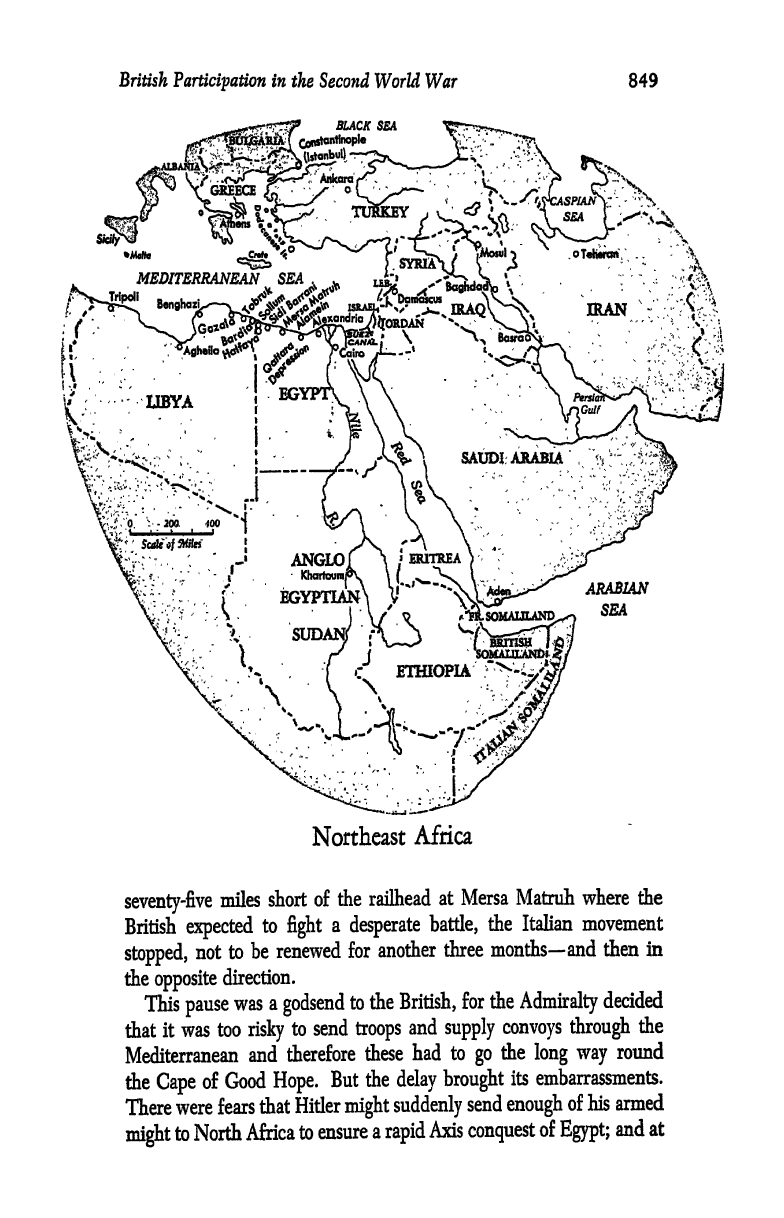
British
Participation
in
the
Second
World
War
849
\
Northeast
Africa
seventy-five
miles
short
of
the railhead
at
Mersa Matruh where
the
British
expected
to
fight
a
desperate
battle,
the Italian
movement
stopped,
not
to
be
renewed
for
another
three
months and
then in
the
opposite
direction.
This
pause
was
a
godsend
to
the
British,
for
the
Admiralty
decided
that
it
was
too
risky
to
send
troops
and
supply
convoys through
the
Mediterranean
and
therefore
these
had
to
go
the
long way
round
the
Cape
of
Good
Hope.
But
the
delay brought
its
embarrassments.
There
were
fears
that
Hitler
might
suddenly
send
enough
of
his
armed
might
to
North
Africa
to
ensure
a
rapid
Axis
conquest
of
Egypt;
and
at
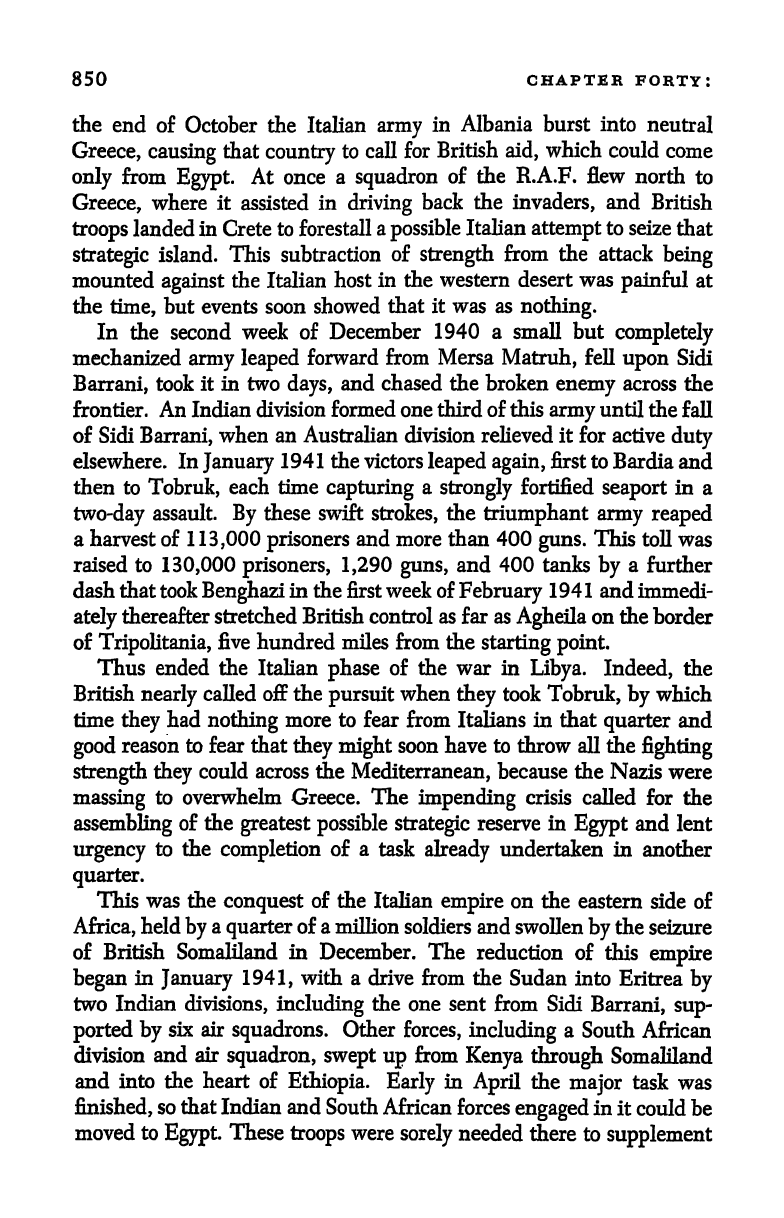
850
CHAPTER
FORTY:
the
end of
October
the
Italian
army
in
Albania burst
into
neutral
Greece,
causing
that
country
to
call for
British
aid,
which
could
come
only
from
Egypt.
At once
a
squadron
of
the R.A.F. flew
north
to
Greece,
where it assisted
in
driving
back
the
invaders,
and
British
troops
landed
in Crete to forestall
a
possible
Italian
attempt
to
seize
that
strategic
island. This
subtraction
of
strength
from
the
attack
being
mounted
against
the
Italian
host
in the
western desert was
painful
at
the
time,
but events soon showed
that it
was
as
nothing.
In
the second
week
of
December
1940 a
small
but
completely
mechanized
army leaped
forward from Mersa
Matruh,
fell
upon
Sidi
Barrani,
took
it in two
days,
and
chased the broken
enemy
across the
frontier.
An
Indian
division
formed
one third
of this
army
until the
fall
of Sidi
Barrani,
when
an
Australian division relieved it for
active
duty
elsewhere. In
January
1941 the victors
leaped
again,
first
to
Bardia
and
then
to
Tobruk,
each
time
capturing
a
strongly
fortified
seaport
in
a
two-day
assault.
By
these swift
strokes,
the
triumphant army
reaped
a harvest of
1
13,000
prisoners
and more than
400
guns.
This
toll
was
raised
to
130,000
prisoners,
1,290
guns,
and
400
tanks
by
a
further
dash
that
took
Benghazi
in
the first week of
February
1941
and
immedi-
ately
thereafter stretched
British
control
as
far as
Agheila
on the
border
of
Tripolitania,
five
hundred
miles
from the
starting
point.
Thus ended the Italian
phase
of the
war
in
Libya.
Indeed,
the
British
nearly
called
off the
pursuit
when
they
took
Tobruk,
by
which
time
they
had
nothing
more to fear
from Italians in
that
quarter
and
good
reason
to
fear
that
they
might
soon
have to throw
all
the
fighting
strength
they
could across
the
Mediterranean,
because the
Nazis
were
massing
to overwhelm
Greece.
The
impending
crisis
called for
the
assembling
of
the
greatest possible
strategic
reserve
in
Egypt
and lent
urgency
to
the
completion
of
a
task
already
undertaken
in
another
quarter.
This
was the
conquest
of
the
Italian
empire
on the
eastern
side of
Africa,
held
by
a
quarter
of
a
million
soldiers and
swollen
by
the
seizure
of
British
Somaliland in December. The
reduction of
this
empire
began
in
January
1941,
with a
drive from the
Sudan into
Eritrea
by
two Indian
divisions,
including
the
one sent
from Sidi
Barrani,
sup-
ported
by
six
air
squadrons.
Other
forces,
including
a
South
African
division
and
air
squadron,
swept up
from
Kenya
through
Somaliland
and into the
heart
of
Ethiopia.
Early
in
April
the
major
task was
finished,
so
that
Indian and South
African
forces
engaged
in
it
could be
moved to
Egypt.
These
troops
were
sorely
needed
there
to
supplement
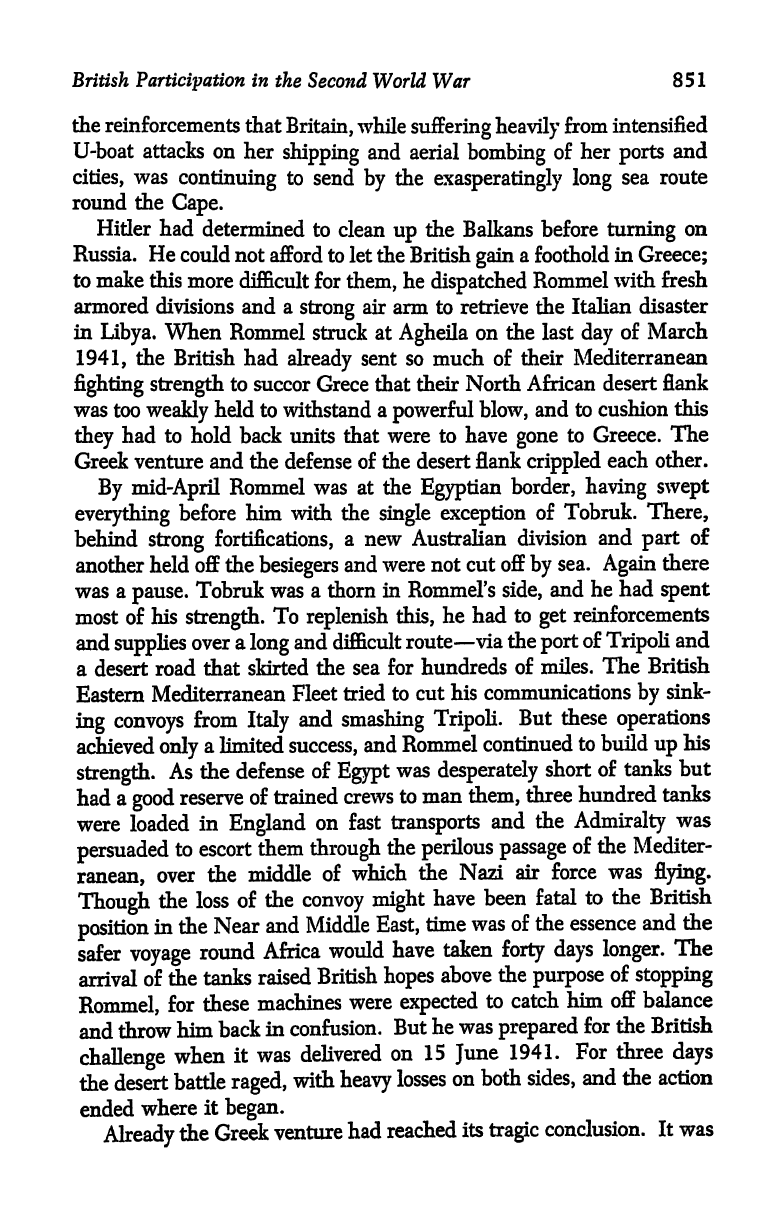
British
Participation
in
the
Second
World
War
851
the
reinforcements
that
Britain,
while
suffering
heavily
from
intensified
U-boat
attacks
on her
shipping
and aerial
bombing
of
her
ports
and
cities,
was
continuing
to
send
by
the
exasperatingly
long
sea route
round the
Cape.
Hitler
had
determined to
clean
up
the Balkans before
turning
on
Russia.
He
could
not
afford
to
let the British
gain
a
foothold
in
Greece;
to make this
more
difficult
for
them,
he
dispatched
Rommel
with
fresh
armored
divisions and
a
strong
air
arm
to
retrieve
the
Italian
disaster
in
Libya.
When
Rommel struck at
Agheila
on
the
last
day
of
March
1941,
the
British
had
already
sent so much of
their
Mediterranean
fighting strength
to succor
Grece
that their
North
African desert
flank
was
too
weakly
held
to withstand
a
powerful
blow,
and to
cushion
this
they
had to
hold
back units
that were to
have
gone
to
Greece.
The
Greek
venture and
the defense
of
the
desert
flank
crippled
each
other.
By mid-April
Rommel
was at the
Egyptian
border,
having
swept
everything
before
him with the
single
exception
of Tobruk.
There,
behind
strong
fortifications,
a
new
Australian
division
and
part
of
another held
off the
besiegers
and
were not cut
off
by
sea.
Again
there
was a
pause.
Tobruk
was
a
thorn
in Rommel's
side,
and
he had
spent
most of
his
strength.
To
replenish
this,
he had
to
get
reinforcements
and
supplies
over
a
long
and
difficult
route
via
the
port
of
Tripoli
and
a
desert
road
that
skirted
the sea
for hundreds
of
miles.
The
British
Eastern
Mediterranean
Fleet
tried
to
cut
his communications
by
sink-
ing
convoys
from
Italy
and
smashing
Tripoli.
But
these
operations
achieved
only
a
limited
success,
and
Rommel
continued
to build
up
his
strength.
As
the defense
of
Egypt
was
desperately
short
of
tanks
but
had
a
good
reserve
of
trained
crews
to man
them,
three
hundred
tanks
were loaded
in
England
on
fast
transports
and
the
Admiralty
was
persuaded
to escort
them
through
the
perilous
passage
of the
Mediter-
ranean,
over
the
middle
of
which
the
Nazi
air force
was
flying.
Though
the
loss
of
the
convoy
might
have been
fatal
to
the
British
position
in
the
Near
and
Middle
East,
time
was of the
essence
and the
safer
voyage
round
Africa
would
have
taken
forty
days
longer.
The
arrival
of
the
tanks
raised
British
hopes
above
the
purpose
of
stopping
Rommel,
for
these
machines
were
expected
to
catch
him
off balance
and
throw
him
back
in confusion.
But
he
was
prepared
for the British
challenge
when
it
was
delivered
on
15
June
1941.
For
three
days
the
desert
battle
raged,
with
heavy
losses
on
both
sides,
and
the
action
ended
where
it
began.
Already
the Greek
venture
had
reached
its
tragic
conclusion.
It was
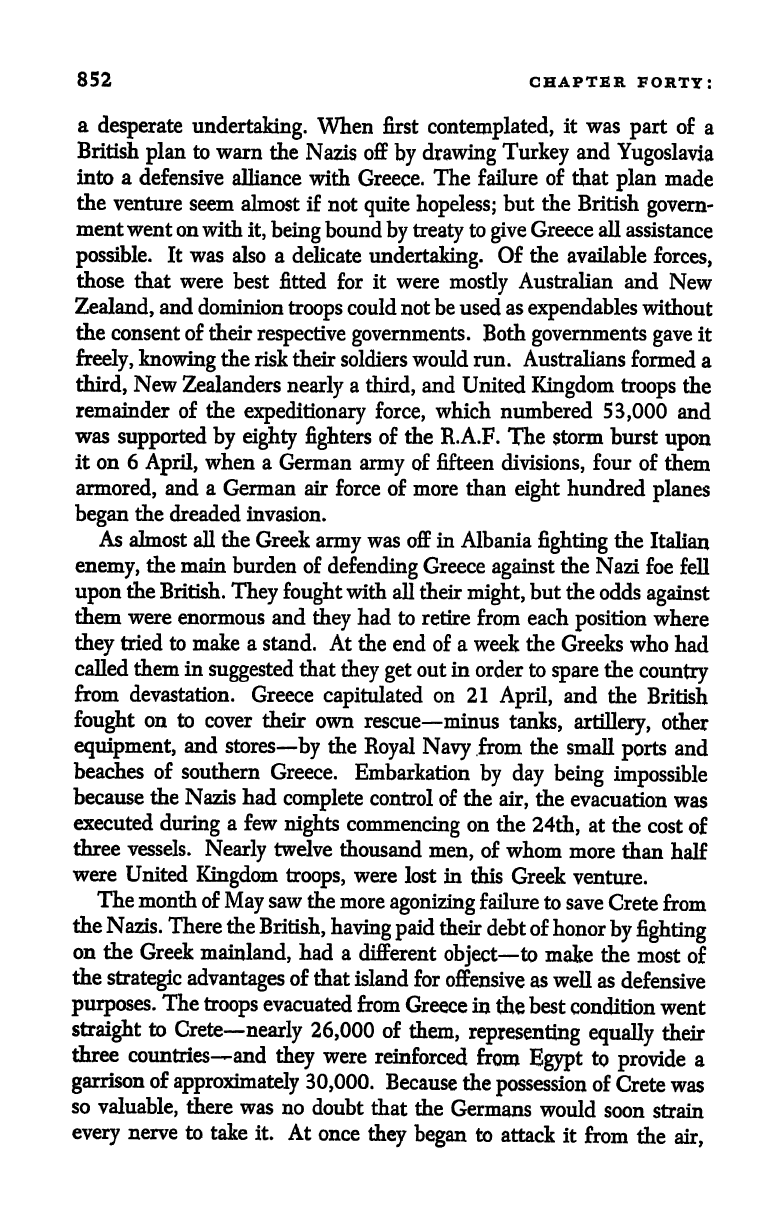
852
CHAPTER
FORTY:
a
desperate
undertaking.
When first
contemplated,
it
was
part
of
a
British
plan
to warn
the
Nazis
off
by
drawing
Turkey
and
Yugoslavia
into
a
defensive
alliance
with
Greece.
The failure
of
that
plan
made
the
venture
seem
almost if
not
quite hopeless;
but
the British
govern-
ment
went on
with
it,
being
bound
by treaty
to
give
Greece all
assistance
possible.
It
was
also
a
delicate
undertaking.
Of
the
available
forces,
those
that
were
best fitted for
it were
mostly
Australian
and
New
Zealand,
and
dominion
troops
could
not
be
used
as
expendables
without
the
consent of their
respective
governments.
Both
governments
gave
it
freely,
knowing
the
risk their
soldiers would
run.
Australians
formed
a
third,
New
Zealanders
nearly
a
third,
and
United
Kingdom
troops
the
remainder of the
expeditionary
force,
which
numbered
53,000
and
was
supported by
eighty fighters
of the
R.A.F.
The storm
burst
upon
it on 6
April,
when a
German
army
of
fifteen
divisions,
four
of
them
armored,
and
a
German
air
force
of
more
than
eight
hundred
planes
began
the
dreaded invasion.
As
almost
all the Greek
army
was off in
Albania
fighting
the
Italian
enemy,
the
main
burden
of
defending
Greece
against
the
Nazi
foe
fell
upon
the
British.
They
fought
with
all their
might,
but
the odds
against
them
were
enormous and
they
had
to retire
from
each
position
where
they
tried to make a
stand.
At
the end
of
a
week
the
Greeks
who
had
called them
in
suggested
that
they
get
out in
order
to
spare
the
country
from
devastation.
Greece
capitulated
on 21
April,
and the
British
fought
on
to cover
their
own
rescue minus
tanks,
artillery,
other
equipment,
and stores
by
the
Royal
Navy
.from
the
small
ports
and
beaches of
southern
Greece.
Embarkation
by day
being
impossible
because the Nazis
had
complete
control of the
air,
the
evacuation
was
executed
during
a
few
nights
commencing
on
the
24th,
at
the
cost
of
three
vessels.
Nearly
twelve
thousand
men,
of whom
more
than
half
were
United
Kingdom
troops,
were
lost
in
this
Greek
venture.
The
month of
May
saw
the
more
agonizing
failure
to save
Crete
from
the
Nazis.
There the
British,
having paid
their
debt of
honor
by
fighting
on the
Greek
mainland,
had a
different
object
to
make
the
most
of
the
strategic
advantages
of
that
island
for
offensive
as well as
defensive
purposes.
The
troops
evacuated
from
Greece
in
the
best
condition
went
straight
to Crete
nearly
26,000
of
them,
representing
equally
their
three
countries
and
they
were
reinforced
from
Egypt
to
provide
a
garrison
of
approximately
30,000.
Because the
possession
of
Crete
was
so
valuable,
there
was no
doubt
that
the
Germans would
soon
strain
every
nerve to
take
it. At
once
they
began
to
attack
it
from
the
air,
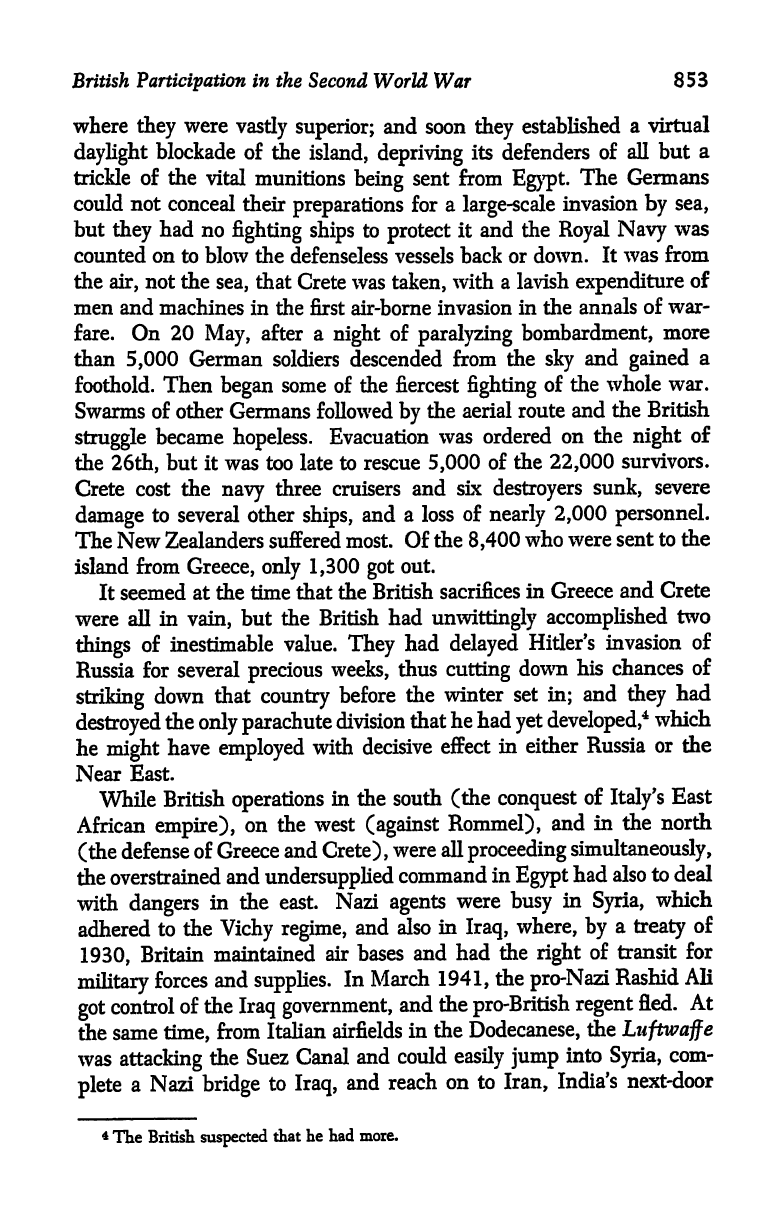
British
Participation
in
the
Second
World
War
853
where
they
were
vastly
superior;
and
soon
they
established
a
virtual
daylight
blockade
of
die
island,
depriving
its defenders
of
all but
a
trickle of the
vital
munitions
being
sent from
Egypt.
The Germans
could not
conceal
their
preparations
for
a
large-scale
invasion
by
sea,
but
they
had
no
fighting ships
to
protect
it
and the
Royal
Navy
was
counted
on
to blow the
defenseless vessels back
or down.
It
was from
the
air,
not
the
sea,
that
Crete was
taken,
with a lavish
expenditure
of
men
and machines in the first
air-borne
invasion
in the
annals
of
war-
fare. On
20
May,
after a
night
of
paralyzing
bombardment,
more
than
5,000
German soldiers descended
from
the
sky
and
gained
a
foothold.
Then
began
some
of
the fiercest
fighting
of
the
whole
war.
Swarms
of other Germans followed
by
the
aerial route and
the
British
struggle
became
hopeless.
Evacuation
was
ordered on
the
night
of
the
26th,
but
it was
too
late
to rescue
5,000
of
the
22,000
survivors.
Crete
cost the
navy
three cruisers and
six
destroyers
sunk,
severe
damage
to several other
ships,
and
a
loss
of
nearly
2,000
personnel.
The New Zealanders suffered
most.
Of
the
8,400
who
were sent
to the
island
from
Greece,
only
1,300
got
out.
It seemed
at the
time
that the
British sacrifices
in Greece
and Crete
were
all
in
vain,
but
the
British had
unwittingly
accomplished
two
things
of
inestimable
value.
They
had
delayed
Hitler's
invasion
of
Russia
for several
precious
weeks,
thus
cutting
down
his chances
of
striking
down
that
country
before
the
winter
set
in;
and
they
had
destroyed
the
only parachute
division
that
he had
yet
developed,
4
which
he
might
have
employed
with
decisive
effect
in
either
Russia
or
the
Near
East.
While
British
operations
in
the south
(the
conquest
of
Italy's
East
African
empire),
on the
west
(against
Rommel),
and
in the
north
(the
defense
of Greece
and
Crete),
were
all
proceeding
simultaneously,
the
overstrained
and
undersupplied
command
in
Egypt
had
also
to deal
with
dangers
in
the east.
Nazi
agents
were
busy
in
Syria,
which
adhered
to
the
Vichy
regime,
and
also
in
Iraq,
where,
by
a
treaty
of
1930,
Britain
maintained
air bases
and
had
the
right
of
transit for
military
forces
and
supplies.
In
March
1941,
the
pro-Nazi
Rashid
All
got
control
of
the
Iraq
government,
and the
pro-British
regent
fled.
At
the
same
time,
from
Italian
airfields
in the
Dodecanese,
the
Luftwaffe
was
attacking
the
Suez Canal
and
could
easily jump
into
Syria,
com-
plete
a
Nazi
bridge
to
Iraq,
and
reach
on to
Iran,
India's
next-door
4
The
British
suspected
that
he
had
more.
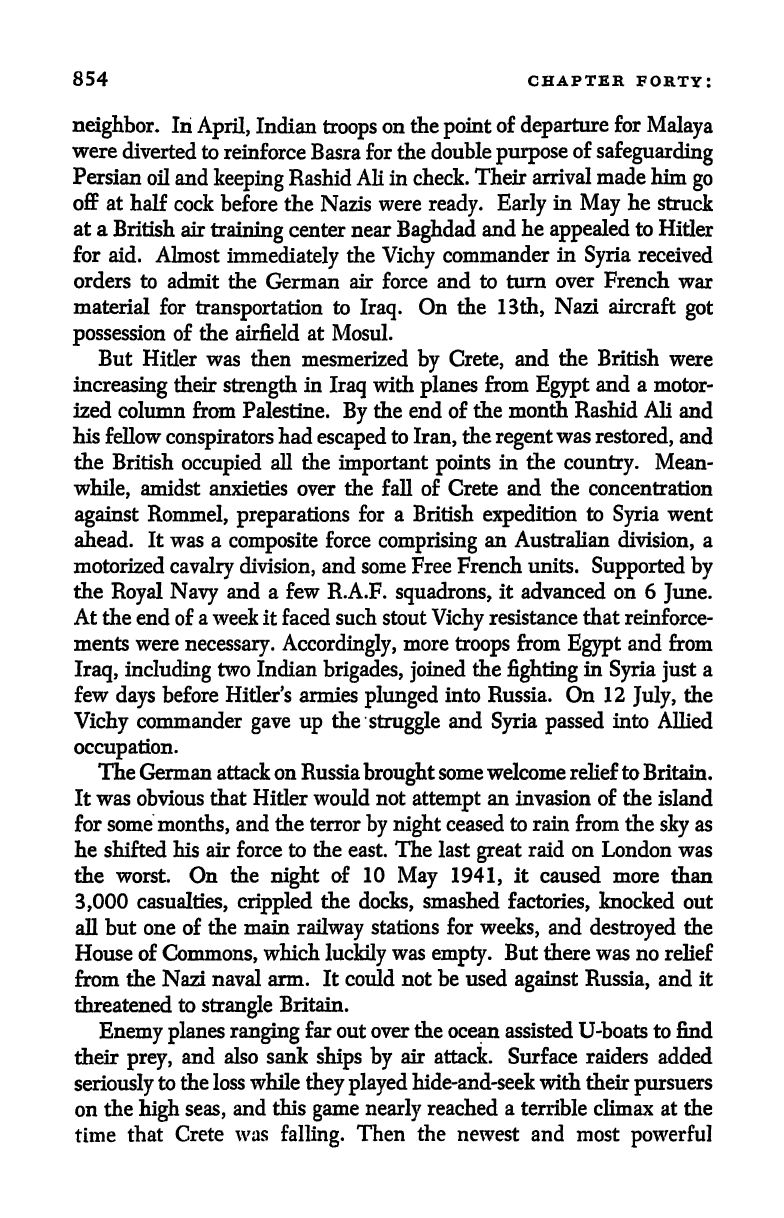
854
CHAPTER
FORTY:
neighbor*
In
April,
Indian
troops
on
the
point
of
departure
for
Malaya
were
diverted to
reinforce
Basra
for
the double
purpose
of
safeguarding
Persian
oil and
keeping
Rashid Ali
in
check.
Their
arrival made him
go
off at
half
cock
before
the Nazis
were
ready.
Early
in
May
he
struck
at a
British air
training
center
near
Baghdad
and
he
appealed
to
Hitler
for
aid.
Almost
immediately
the
Vichy
commander
in
Syria
received
orders
to admit
the
German
air
force
and to
turn
over
French
war
material
for
transportation
to
Iraq.
On
the
13th,
Nazi aircraft
got
possession
of
the
airfield
at
Mosul.
But
Hitler was then
mesmerized
by
Crete,
and
the British
were
increasing
their
strength
in
Iraq
with
planes
from
Egypt
and
a
motor-
ized column
from Palestine.
By
the
end of
the month
Rashid
Ali
and
his
fellow
conspirators
had
escaped
to
Iran,
the
regent
was
restored,
and
the British
occupied
all
the
important points
in
the
country.
Mean-
while,
amidst
anxieties over
the
fall
of
Crete
and
the
concentration
against
Rommel,
preparations
for
a
British
expedition
to
Syria
went
ahead.
It
was
a
composite
force
comprising
an
Australian
division,
a
motorized
cavalry
division,
and some Free
French units.
Supported by
the
Royal Navy
and a
few
R.A.F.
squadrons,
it
advanced
on 6
June.
At the
end of
a
week
it
faced such stout
Vichy
resistance that
reinforce-
ments were
necessary.
Accordingly,
more
troops
from
Egypt
and
from
Iraq, including
two Indian
brigades,
joined
the
fighting
in
Syria just
a
few
days
before
Hitler's
armies
plunged
into Russia.
On
12
July,
the
Vichy
commander
gave up
the
struggle
and
Syria
passed
into
Allied
occupation.
The German attack on Russia
brought
some
welcome relief
to Britain.
It
was
obvious
that Hitler
would
not
attempt
an
invasion of the
island
for
some
months,
and
the terror
by night
ceased to
rain
from the
sky
as
he shifted his
air force to
the
east. The
last
great
raid on London was
the worst.
On
the
night
of
10
May
1941,
it
caused more
than
3,000
casualties,
crippled
the
docks,
smashed
factories,
knocked
out
all but
one of
the main
railway
stations for
weeks,
and
destroyed
the
House
of
Commons,
which
luckily
was
empty.
But there was
no
relief
from
the Nazi naval
arm. It
could
not be
used
against
Russia,
and
it
threatened
to
strangle
Britain.
Enemy planes ranging
far
out
over
the ocean assisted
U-boats to find
their
prey,
and
also sank
ships
by
air attack.
Surface raiders
added
seriously
to
the
loss while
they
played
hide-and-seek with their
pursuers
on
the
high
seas,
and
this
game
nearly
reached
a
terrible
climax
at
the
time
that
Crete
was
falling.
Then
the
newest and
most
powerful
